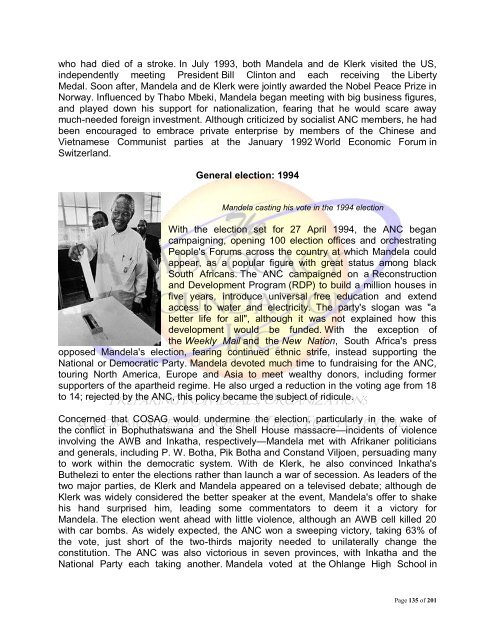Create successful ePaper yourself
Turn your PDF publications into a flip-book with our unique Google optimized e-Paper software.
who had died <strong>of</strong> a stroke. In July 1993, both Mandela and de Klerk visited the US,<br />
independently meeting President Bill Clinton and each receiving the Liberty<br />
Medal. Soon after, Mandela and de Klerk were jointly awarded the Nobel Peace Prize in<br />
Norway. Influenced by Thabo Mbeki, Mandela began meeting with big business figures,<br />
and played down his support for nationalization, fearing that he would scare away<br />
much-needed foreign investment. Although criticized by socialist ANC members, he had<br />
been encouraged to embrace private enterprise by members <strong>of</strong> the Chinese and<br />
Vietnamese Communist parties at the January 1992 World Economic Forum in<br />
Switzerland.<br />
General election: 1994<br />
Mandela casting his vote in the 1994 election<br />
With the election set for 27 April 1994, the ANC began<br />
campaigning, opening 100 election <strong>of</strong>fices and orchestrating<br />
People's Forums across the country at which Mandela could<br />
appear, as a popular figure with great status among black<br />
South Africans. <strong>The</strong> ANC campaigned on a Reconstruction<br />
and Development Program (RDP) to build a million houses in<br />
five years, introduce universal free education and extend<br />
access to water and electricity. <strong>The</strong> party's slogan was "a<br />
better life for all", although it was not explained how this<br />
development would be funded. With the exception <strong>of</strong><br />
the Weekly Mail and the New Nation, South Africa's press<br />
opposed Mandela's election, fearing continued ethnic strife, instead supporting the<br />
National or Democratic Party. Mandela devoted much time to fundraising for the ANC,<br />
touring North America, Europe and Asia to meet wealthy donors, including former<br />
supporters <strong>of</strong> the apartheid regime. He also urged a reduction in the voting age from 18<br />
to 14; rejected by the ANC, this policy became the subject <strong>of</strong> ridicule.<br />
Concerned that COSAG would undermine the election, particularly in the wake <strong>of</strong><br />
the conflict in Bophuthatswana and the Shell House massacre—incidents <strong>of</strong> violence<br />
involving the AWB and Inkatha, respectively—Mandela met with Afrikaner politicians<br />
and generals, including P. W. Botha, Pik Botha and Constand Viljoen, persuading many<br />
to work within the democratic system. With de Klerk, he also convinced Inkatha's<br />
Buthelezi to enter the elections rather than launch a war <strong>of</strong> secession. As leaders <strong>of</strong> the<br />
two major parties, de Klerk and Mandela appeared on a televised debate; although de<br />
Klerk was widely considered the better speaker at the event, Mandela's <strong>of</strong>fer to shake<br />
his hand surprised him, leading some commentators to deem it a victory for<br />
Mandela. <strong>The</strong> election went ahead with little violence, although an AWB cell killed 20<br />
with car bombs. As widely expected, the ANC won a sweeping victory, taking 63% <strong>of</strong><br />
the vote, just short <strong>of</strong> the two-thirds majority needed to unilaterally change the<br />
constitution. <strong>The</strong> ANC was also victorious in seven provinces, with Inkatha and the<br />
National Party each taking another. Mandela voted at the Ohlange High School in<br />
Page 135 <strong>of</strong> 201

















